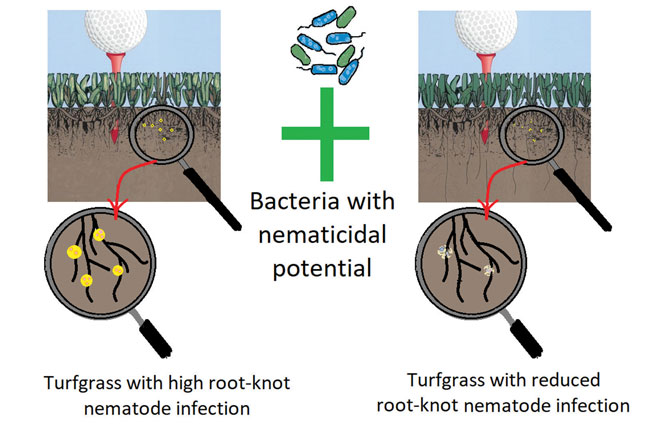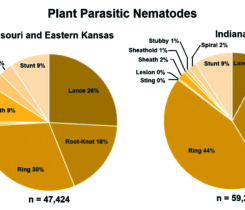A novel management strategy for root-knot nematodes
Meloidogyne spp., root-knot nematodes, are among turfgrass’s most economically-important plant-parasitic nematodes in the U.S.
Recent work at Auburn University demonstrated the potential for microbial control of root-knot nematodes in turfgrass. The research team included Will Groover, Ph.D., David Held, Ph.D., Kathy Lawrence, Ph.D., and Kendra Carson.

Some bacterial strains can potentially reduce the population density of root-knot nematodes and enhance turfgrass root growth. (Graphic: Will Groover, Ph.D.)
The researchers evaluated the efficacy of 104 plant growth-promoting rhizobacteria (PGPR) strains isolated from grasses in Alabama against M. incognita in laboratory experiments. They also conducted greenhouse and microplot studies to examine the ability of PGPR to manage plant-parasitic nematodes.
In lab studies, root-knot nematode mortality ranged from 0.9 percent to 94.6 percent by all strains screened. Researchers selected ten individual PGPR strains and one three-strain blend for testing in the greenhouse microplots.
Six of the 11 PGPR treatments significantly reduced the population density of root-knot nematodes in greenhouse studies. A few strains also appeared to promote some root growth. Five of the 11 treatments significantly reduced the population density of root-knot nematodes in microplot experiments.
Of these strains, the researchers identified 11 as Bacillus spp., one as Stenotrophomonas rhizophila, and one as Paenibacillus sonchi. Eight of these strains also were found to have nitrogenase activity, and seven could produce siderophores.
Siderophores are iron-chelating compounds secreted by microorganisms. They help organisms accumulate iron and show a potential mechanism for growth promotion.
Results indicate that multiple strains of Bacillus spp., and one strain of S. rhizophila can potentially reduce the density of root-knot nematodes and enhance root growth.
Generally, microbial controls of turfgrass pest problems are challenging to scale up to the golf course. However, it is interesting evidence that a lot is happening in the plant-soil microbiome.












